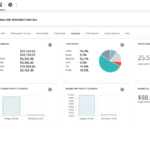Securing landscaping jobs can become challenging during a recession as it affects your business and customers’ ability to pay for your services.
With an impending or ongoing economic downturn, landscapers must adapt their business strategies to effectively navigate the situation without compromising long-term goals.
It is possible to emerge from a recession unscathed and maintain thriving jobs. This period can also serve as an opportunity to identify areas for improvement within your business, regardless of the economic climate.
The landscaping industry faced supply chain issues caused by the COVID-19 pandemic and remained cautious about the consequences of the 2008 recession, which led to the housing market collapse.
Small businesses endured significant hardships during the 2008 recession, closing around 1.8 million establishments between 2008 and 2010.
The industry also encountered notable challenges in 2021 with economic recessions. In 2022, it contended with a price surge, including a 50% increase in fuel costs and rising wages in Canada. Furthermore, there was a scarcity of diverse plant species across the country. These circumstances suggest that the landscaping industry may face difficult times ahead.
The year 2022 marked significant challenges, such as an economic recession, rising inflation, labor shortages, and disruptions in the supply chain. During the Equip Expo 2022, experts discussed the industry’s response to these difficulties.
- The landscaping industry’s revenue is projected to grow by 0.9% in 2022, and it has been experiencing an annual growth rate of 6.6% over the past three years.
- Landscaping companies in Canada typically charge CAD 50 to $100 per hour or $4 to $12 per square foot after installation.
- Among landscaping businesses, 32% consider landscape maintenance as their fastest-growing service offering.
- Additionally, 31% of landscaping businesses report that local demand has increased as people spend more time at home.
- Canadian landscaping revenue has expanded at a CAGR of 6.6% to $18.4 billion through the end of 2023
How do you get landscaping, lawn care, and snow removal work in a recession?
The tips are divided into 2 categories. You can do things internally within your company and things that you’d have to do by actually getting out and being there.
You can consider the following strategies to obtain landscape, lawn care, and snow removal jobs during a recession.
The thing that’d require you to be out there:
🔔 Emphasize maintenance subscriptions
Customers can sign up for annual maintenance contracts, providing them with regular and predictable service. Instead of focusing on elaborate landscaping projects, concentrate on essential maintenance services that customers cannot do without, regardless of the state of the economy, such as lawn mowing, weeding, pest control, and irrigation repairs.
Annual maintenance contracts ensure a consistent work stream and help offset potential profit loss during an economic downturn.
💑 Leverage Existing Relationships
This strategy is effective when properly maximized. Building strong connections isn’t limited to customers alone; it extends to homebuilders, contractors, property managers, suppliers, and everyone involved in your business’s success.
By prioritizing communication and maintaining these relationships, you can minimize the impact of potential surprises.
For instance, you can stay ahead of a homebuilder’s slowdown in new builds, anticipate contractors’ decisions to exit or raise prices and address any customer concerns that could lead to service cancellations. To achieve this, regular and consistent communication is key.
It’s essential to keep in touch with clients through various means, such as holiday cards, updates on weather-related delays, satisfaction surveys, and prompt follow-up calls after receiving complaints. Additionally, you can keep clients informed about operational changes.
🫖 Warm up cold leads
In challenging economic times, potential customers may have put their landscaping or snow removal projects on hold. Reach out to these leads and emphasize how your services can help them save money or enhance their property’s value.
Highlight the cost-effectiveness of regular maintenance, such as preventing costly repairs or improving curb appeal.
Additionally, it emphasizes the importance of maintaining a safe and functional outdoor space, especially during the winter months.
🏷️💲 Cross-sell
Many homeowners and businesses in Canada require both landscaping and snow removal services. By cross-selling these services, you can offer convenience and cost savings to your existing clients.
Present bundled packages combining regular lawn care with seasonal snow removal, showcasing the advantages of dealing with a single provider for outdoor maintenance needs.
Consider offering discounts or incentives for clients who opt for combined services, as this can increase customer loyalty and retention.
➕➕ Provide more value
In a recession, customers are more likely to carefully evaluate their spending and seek the best value for their money. Showcase the additional value your business offers.
For example, emphasize your commitment to eco-friendly practices, such as using organic fertilizers or promoting sustainable landscaping techniques.
Canadian consumers are increasingly conscious of environmental impact, so highlighting your eco-friendly approach can attract green-minded clients.
Additionally, we offer personalized landscaping designs tailored to your client’s preferences and budget constraints. Provide free consultations or maintenance tips to demonstrate your expertise and dedication to customer satisfaction. By going above and beyond the essential services, you can differentiate your business and appeal to cost-conscious customers seeking long-term value.
📺 Find more sales channels
Explore additional avenues to promote your services. Advertise on social media platforms, create a website showcasing your portfolio, and consider local online marketplaces where customers search for service providers.
-> Commercial jobs:
Target commercial properties, such as offices, shopping centers, and apartment complexes, as they require regular maintenance and snow removal.
-> Subcontract:
Establish partnerships with more considerable landscaping or property management companies that may require additional workforce during busy seasons. They can subcontract work to your business, providing a consistent flow of projects.
-> Homeowners associations:
Engage with homeowners associations in your area. Offer competitive bids for landscape maintenance or snow removal contracts for common areas or residential communities.
-> Door knock if you have to:
In some instances, direct outreach can be effective. Identify neighborhoods or areas where your services would be in demand and go door-to-door to introduce yourself, distribute flyers, and offer your services.
-> Build relationships with designers and architects:
Connect with professionals in the design and architecture industry. They often collaborate with landscapers to bring their plans to life. Building strong relationships with them can lead to referrals and joint projects.
-> Register on marketplaces:
List your services on online marketplaces, such as local service directories or platforms that connect homeowners with service providers. It can help you increase visibility and attract potential clients.
-> Do smaller and unconventional jobs:
During a recession, some customers may have limited budgets or specific needs. Be open to taking on smaller or unconventional jobs that may not be your typical projects as long as they generate a net positive income for your business. This flexibility can help you attract a broader range of clients.
Things that’d require an internal change:
🎛️ Control costs
Reviewing your business budget and making necessary adjustments when approaching a recession becomes even more crucial. You can better navigate the challenging economic climate by operating costs such as payroll, rent, and other overhead expenses. It is important to note that having landscaping insurance at this time helps you stay protected from abnormal expenses.
This proactive approach allows you to optimize your labor and identify areas where you can cut unnecessary expenditures. Understanding your business’s cash flow trends, particularly during a recession, can help you uncover recurring profitability issues and address them effectively.
Implementing cost-saving measures and optimizing your business operations shouldn’t be delayed until a recession hits, as it’s beneficial to start minimizing overhead, unproductive labor (DO NOT FIRE THEM, TRAIN THEM). Other costs ahead of time while doing this, quality should be maintained.
📈 Rent/outsource equipment and services
Instead of purchasing equipment, consider renting it if you only need it for occasional jobs not part of your regular services. However, evaluate if these services attract high-paying customers before continuing to offer them at a loss. Assess your operational area and reduce the distance you are willing to travel to clients to minimize gas expenses and non-productive time spent on transportation. By analyzing reports and analytics, you can identify the services that generate profits and eliminate the ones that are causing financial losses in the long term.
- Virtual Receptionist Instead of In-House: Hire a virtual receptionist or utilize virtual phone services to handle incoming calls, schedule appointments, and manage administrative tasks. This can help you get more time to focus on revenue-generating activities.
- Increase Follow-Up Calls: Implement a structured follow-up system to communicate regularly with existing and potential clients. This consistent approach demonstrates your professionalism and keeps your business top of mind.
- Ask for Referrals: Train your team to ask satisfied clients for referrals. A positive word-of-mouth referral can significantly increase your chances of securing new jobs and expanding your client base.
- Business Management Software: Invest in a comprehensive business management software solution to streamline administrative tasks, track projects, manage finances, and improve efficiency.
- Outsource Marketing to an Agency: Consider outsourcing your marketing efforts to a specialized agency. They can help optimize your marketing channels, generate leads, explore new avenues for promotion, and leverage data-driven strategies to make informed decisions.
- Sub Out Other Work to Small Subcontractors: If specific tasks or projects fall outside your expertise or require specialized knowledge, subcontract them to reliable, trusted subcontractors. This allows you to focus on your core strengths and provide high-quality services.
⚡ Optimize your workforce efficiency
Instead of laying off employees or freezing hiring during a recession or labor shortage, prioritize improving the efficiency of your current workforce. – Offer additional training to make your employees more versatile, such as teaching them how to operate larger machines or effectively manage their crew.
Implement technology solutions, like job management systems, to enhance your workforce’s performance in the field.
Optimize routing for your crews to minimize travel time and maximize productivity.
Provide mobile applications to your employees to streamline the completion of work orders and timesheet submission.
Utilize analytics to identify and address any profitability issues without resorting to employee layoffs.
Focus on retaining competent employees while finding ways to improve their productivity and effectiveness.
🎯 Focus on the jobs you do best with differentiated offerings
Identify your unique selling points and prioritize the services in which your business excels. Specializing in specific areas allows you to establish a reputation for excellence and stand out from competitors.
🛠️ Add recession-proof services to your list
Recession-proof services like residential mowing and lawn cutting remain unaffected by economic recessions. It has been emphasized that lawn care is particularly resilient during tough times.
People who already pay for lawn care services are unlikely to stop doing so during a recession. While some individuals may consider cutting their lawns due to possible job layoffs, most homeowners who have invested in their lawns are committed to maintaining them.
Although landscaping and hardscape projects may be postponed, lawn maintenance remains necessary. Regular treatments, cutting, trimming, and upkeep are essential for every yard.
By establishing a reliable customer base for lawn care maintenance, you can sustain your business even during a recession, minimizing losses in other construction-related areas.
Things that you’d already know:
📝 Have a Plan
Having a well-developed plan is crucial during a recession. This strategic plan should outline your business goals, target market, marketing strategies, and financial projections. Regularly reviewing and updating this plan will help you adapt to changing market conditions and stay focused on your objectives, even in challenging times.
💰 Budget
Budgeting becomes more critical during a recession. Maintaining a detailed budget allows you to track your expenses and revenue closely. By doing so, you can identify areas where you can reduce costs, allocate resources effectively, and ensure profitability, especially when uncertain economic conditions.
❌ Don’ts During a Recession
❎ Don’t cut down the expenses:
During a recession, cutting marketing expenses to save money may be tempting. However, reducing marketing expenditures can limit your visibility and lead to declining new leads and opportunities.
Instead of completely cutting back, focus on innovative marketing strategies that maximize your return on investment and target your ideal customer base.
❎ Don’t outsource compromising quality
While outsourcing can be a cost-effective solution, it’s crucial not to compromise on the quality of work, even during a recession.
Avoid outsourcing to countries solely based on low costs if it compromises the standard of service you provide. Prioritizing quality and customer satisfaction to maintain a strong reputation becomes even more critical during tough economic times.
❎ Don’t sacrifice the long term for short
It’s essential not to sacrifice long-term opportunities for short-term gains during a recession. Although it may be tempting to accept any job that comes your way, assess each opportunity’s long-term potential and profitability.
Avoid taking on projects that may strain your resources or hinder your ability to pursue more lucrative ventures in the future.
❎ Don’t undervalue your employees
Lastly, in a recession, valuing and investing in your employees is vital. Building good relationships with your team, treating them well, recognizing their contributions, providing fair compensation, and offering growth opportunities can reduce employee turnover.
Retaining valuable team members becomes crucial during a recession when your workforce plays a significant role in the success of your business.
⚠️ Issues plaguing the Landscaping Industry ⚠️
👷🏼 Labour shortage
Labor markets in Canada are experiencing an unprecedented shortage in nearly every industry and sector. Labour has been a prominent issue in the landscape market for the past decade, and the challenges posed by the pandemic have intensified the problem.
According to the Landscape Management (LM) State of the Industry Report published in December, 81 percent of landscape businesses experienced a workforce shortage in 2021.
Similarly, the National Association of Landscape Professionals’ 2021 Financial Benchmark Study found that “finding qualified employees” was the top concern among respondents. Consequently, the shortage of workers has led to a significant increase in wages.
According to a report from The Conference Board, companies across the economy anticipate raising salary budgets by 4 percent on average in 2022, marking the highest growth rate since 2008.
As of June 2022, businesses in Canada have posted almost 70 percent more job openings compared to pre-pandemic levels.
However, they compete for 13 percent fewer unemployed workers than those available in February 2020. This shortage is significantly impacting companies, with over half of Canadian businesses reporting that labor shortages are hindering their ability to increase production. This percentage rose from 40 percent before the pandemic to 30 percent a decade ago.
Labor remains a significant concern; fuel costs have become slightly more worrisome. Landscape contractors are understandably worried about fuel prices, although there might be some relief shortly.
In 2021, the average price of regular gasoline in the United States was $3.02 per gallon, compared to an average of $2.18 per gallon in 2020, representing a nearly 40 percent increase. The positive news is that the agency predicts gasoline prices will only rise by 1 percent, averaging $3.06 per gallon in 2022.
💸. Inflation
Since the third quarter of 2021, the Canadian economy has experienced a strong recovery from pandemic lockdowns, driven by pent-up consumer demand and government support, resulting in consistent GDP growth.
The Bank of Canada had increased interest rates to combat inflation, resulting in a cooling housing market. This recent increase and previous hikes indicate a significant effort to control inflation since the COVID-19 pandemic. Economists predict another interest rate hike in October, which may be the last.
Despite recent economic progress, inflation and a tightening labour market are expected to continue posing challenges in 2023, there are concerns about inflation leading to a rise in unemployment and ongoing labour shortages which would affect the landscape business.
These factors pose a significant risk, suggesting Canada may face a recession in early 2024. Inflation is expected to persist due to the prolonged war in Ukraine and a tight labor market.
🚚 Supply chain disruption
Supply chain disruptions have been widely observed in various industries, including the commercial landscaping market. In 2021, most landscape businesses experienced supply chain issues, leading to difficulties meeting customer demands and affecting project timelines.
The COVID-19 pandemic, increased demand for lawn care and landscaping services, labor shortages, and concerns related to freight and logistics have all contributed to these challenges. Consequently, there has been a shortage of products and materials in the industry.
The supply chain problems have also resulted in price increases across different cost categories in the commercial landscaping industry. Vehicles, equipment, fertilizer, herbicides, plant materials, hardscape materials, and other essential items have become more expensive due to limited supply and high demand. To address these issues, managing customer expectations has become crucial.
Clients who are flexible and open to substitutions may face fewer difficulties, while those with specific preferences may experience longer waiting times. One positive development is the growing trend of using native plants, which can help alleviate some supply chain issues by reducing reliance on scarce or hard-to-obtain non-native species.
📦 Higher Part Delivery Times
During a recession, businesses may experience reduced demand and tighter budgets. This can lead to decreased inventory levels and delayed shipments from suppliers.
Additionally, manufacturers may reduce production, resulting in longer lead times for parts and equipment. The limited availability of resources can hamper productivity and make it even more challenging to complete projects on time.
🏁 High Competition
In a recession, competition in the landscaping industry tends to intensify as companies vie for a shrinking pool of projects. Clients may be more price-sensitive and seek cost-effective options, leading to increased competition based on pricing. To stand out from the competition, landscaping businesses may need to adjust their pricing strategies, focus on value-added services, or explore niche markets.
💳 Exhausting Credit Lines
During an economic downturn, businesses may face reduced access to credit as financial institutions tighten lending criteria.
This can limit the ability of landscaping companies to rely on credit lines for operational expenses, such as purchasing equipment, maintaining cash flow, or covering payroll.
The strain on credit lines can add financial pressure and increase interest payments, impacting the overall profitability and sustainability of the business.
⏳ Late Payments
Recessionary periods often result in a higher incidence of late client payments. Struggling businesses or individuals may delay payments to conserve cash or prioritize other financial obligations.
Late payments can severely impact landscaping companies’ cash flow, making it challenging to cover expenses and maintain financial stability.
Implementing clear payment terms, diligent invoicing, and proactive follow-ups becomes even more critical during a recession.







Your insights into landscaping jobs during a recession provide valuable perspectives. How do you think the landscaping industry has evolved in handling economic downturns, and are there particular strategies you recommend for professionals navigating challenging times?
Hi Greg!
The landscaping industry has shown resilience and adaptability in the face of economic downturns. Despite the hardships faced by landscapers in the west we think that strategic planning coupled with adaptaion to market has added to the overall growth of the industry.